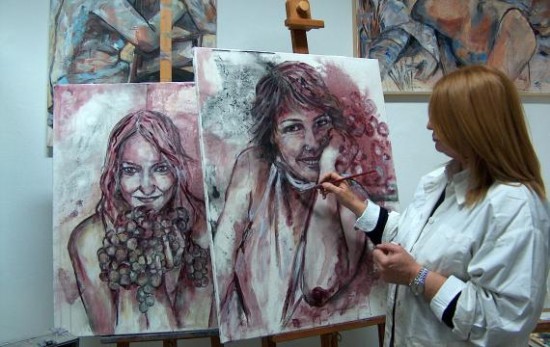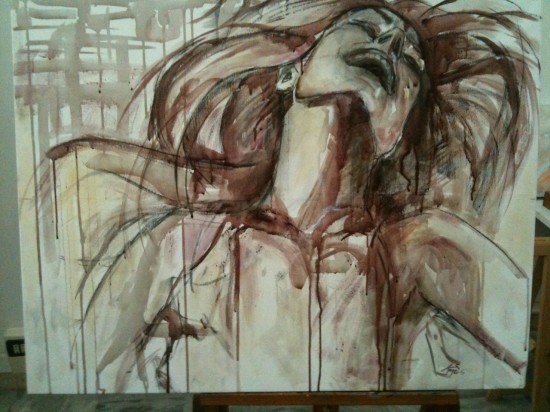Office cubicles aren’t known for inspiring creativity. In fact, they have a reputation for doing just the opposite. But working in a confined space doesn’t always have to be stifling. Meet Bill Taylor, a data manager in Durham, North Carolina who recreates iconic works of art on a whiteboard in his cube. He spends only two to five minutes per day on his drawings, taking roughly six weeks to finish each piece — and then he leave it up for a day or two, photographs the finished product, wipes the board clean, and gets to work on his next masterpiece. “[T]here’s something about doing it this way that forces me to be patient, something I could always use more practice with,” Taylor told the Telegraph.
Tag: Artists
Goldfish Salvation
When struggling with artistic vision, Fukahori’s pet goldfish became his inspiration and ever since his passion and lifelong theme. His unique style of painting uses acrylic on clear resin which is poured into containers, resulting in a three-dimensional appearance and lifelike vitality.
This video gives you a glimpse of his amazing painting process.
Man Spends 16 Years Building 6-Million-Matchstick Model
Bulgarian artist Plamen Ignatov, has dedicated the last 16 years of his life to making a detailed matchstick model of the Rila Monastery, from around 6 million matchsticks.
Now, we’ve posted a lot of impressive matchstick creations, from the model of Minas Tirith built by Patrick Anton, to the matchstick fleet of David Reynolds, but I don’t think I’ve ever seen such a detailed model. Just hearing that the artist spent 16 years working on it, one can tell he was seriously passionate about assembling this matchstick masterpiece, and after laying eyes on it, you understand why it took him so long. The whole religious complex is incredibly detailed, with even the shingles realistically reproduced, and Ignatov even managed to fit a picture of Jesus into one of the walls, and painted religious figures on the wooden pavement of the monastery courtyard.
Rila Monastery is the largest and most famous Orthodox monasteries in Bulgaria, and is regarded as one of the most important cultural and historical monuments in Southern Europe. It is also listed as a UNESCO World Heritage Site.
Italian Artist Paints with Wine
Wine has been the inspiration of many famous painters throughout the centuries, but Florentine artist Elisabetta Rogai is taking the relationship between the drink of Dionysus and art to a whole new level, by using wine as paint.
Can a painting truly age? The concept was first explored English writer Oscar Wilde, in his book, “The Picture of Dorian Gray”, and now, over a century later, it’s taking a new meaning in the work of Elisabetta Rogai. The Italian painter uses only white and red wine, with no other chemical additives, to create beautiful paintings. This “allows the wine to reproduce on the canvas exactly the same process of ageing that normally takes place inside the bottle,” she explains, adding that “the wine aging, which normally occurs over the years, takes only a few months on the canvas.” The difference between a freshly painted artwork and a three-months-old one is clearly visible; the texture changes and the colors evolve from young purples and cherry reds to more mature tones of amber, orange and brown. Unlike the portrait of Dorian Gray, her works become more beautiful with time.
But Elisabetta Rogai wasn’t the first artist to try and paint with wine. Many others have tried before her, but the results were less than satisfactory, due to a variety of factors. The challenge of removing alcohol through Reverse Osmosis, the density of the wine, chromatic scale limitation, the volatility of alcohol and the possibility of working only on small canvases have been the main reasons why most painters gave up on the idea of using wine as paint. Elisabetta Rogai herself admits it took a long period of research and experimentation, and help from the University of Florence to develop her wine paintings, but the results were definitely worth it. Although she uses regular bottled wine for her paintings she also takes bottles of wine to the Florence University laboratory for processing, and takes home a gooey residue with a texture similar to oil paints.
To keep the aging of the wine going on on indefinitely, until the colors fade almost completely, Elisabetta Rogai has created a natural color fixating system based on water and flour. This leaves the hues unchanged but prevents colors from fading over a certain threshold. Her wine paintings are available for prices starting at € 5,000 ($6,400).
Controversial Artist Depicts Obama Trampling The Constitution
In front of the White House a man is sitting on a park bench in the throes of depression. He is surrounded by all 43 presidents. In the forefront, purposefully ignoring the depressed man is President Obama, whose right foot is stepping on the Constitution. James Madison is next to Obama, pleading with him to stop.
This tableau is called “The Forgotten Man”, a painting by Jon McNaughton, an artist who is known for his politically-charged work.
“For a long time I didn’t know if I wanted to paint this picture, because I worried it might be too controversial,” McNaughton explains in a voice over. “(T)his man (on the park bench) represents every man, woman, and child who is an American… he hopes to find the American dream of happiness and prosperity.
“But now because of unconstitutional acts imposed by the American people by our government we stand on the precipice of disasters,” he added.
McNaughton explained his position behind the painting. “I don’t place all the blame on Obama. On my website I try to explain what each president has done,” he said. “The thing I like about the painting is that it does get people talking.”






